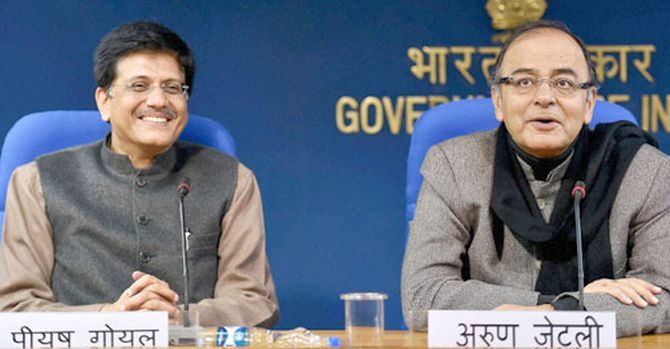While Arun Jaitley remains part of the decision making process, Piyush Goyal, who was given additional charge on May 14, attends cabinet meetings and takes the day-to-day decisions, report Arup Roychoudhury and Aditi Phadnis.

It was clear in the first week of April this year that a replacement for Finance Minister Arun Jaitley would have to be found: Not just to manage the ministries of finance and corporate affairs, while he was in hospital, undergoing dialysis prior to a kidney transplant, but also to address an immediate engagement -- the April meeting of the World Bank-International Monetary Fund, which is always led by the finance minister.
By then, Prime Minister Narendra Modi had assumed responsibility for the finance ministry. But obviously Modi could not attend the meeting. The Prime Minister’s Office weighed many possibilities. Ministers of state for finance could be drafted, but was that the best choice? One option, suggested by Jaitley himself, was to designate Defence Minister Nirmala Sitharaman as leader of the delegation.
Finally, it was the PMO that decided: Reserve Bank of India Governor Urjit Patel would lead the delegation, and, if required, also meet the chief of the World Bank.
Within weeks of that, Piyush Goyal was made finance minister.
Goyal was especially concerned about the effect of high oil prices on the economy. One way of addressing this could be an excise cut. However, officials pointed out that this was untenable for the effect it would have on the fiscal deficit.
Around the time that a number of ministers were dropping hints of a “long-term solution for oil prices”, the finance ministry’s revenue department categorically told the PMO that even an excise duty cut of Re 1 per litre on petrol and diesel could lead to a revenue loss of Rs 140 billion, and strongly advised against it. In May, the PMO called a meeting on the issue. In days, in a blog post, Jaitley ruled out the proposal.
On June 4, the day Jaitley was discharged from hospital after a successful kidney transplant, he had a video-conference with Finance Secretary Hasmukh Adhia, Economic Affairs Secretary Subhash Garg, and Chief Economic Advisor Arvind Subramanian.
His aides said he took stock of the work that was being done in his absence, and discussed economic and policy issues with senior finance ministry staff. After this happened, the guessing games began on social media and in the corridors of power as to who was at the helm in North Block, especially given the fact that Jaitley has been listed on the website of the PMO as “Minister Without Portfolio”.
Government officials maintain that the facts are simpler.
“Jaitley, as a party and government senior, remains part of the decision-making process. While interaction with people has been kept at a minimum as part of post-operative care, he has been having regular video-conferences not just with officials and ministerial colleagues, but also with party functionaries,” said an official.
Jaitley is said to be kept in the loop on all major decisions and work in the finance ministry and the government. In fact, the meeting of the group of ministers on Air India, where it was decided to discontinue with the national carrier’s sale process for now, took place at Jaitley’s residence. This, despite the fact the constituent ministers of the group are present on the strength of their designations, and not names.
Also, outgoing CEA Arvind Subramanian informed Jaitley of his decision to leave his post much before the end of his tenure. Hence, the CEA’s resignation was also sent to Jaitley.
As far as official work is concerned, Goyal is finance minister. The files go to him, he attends cabinet meetings and other engagements, the five secretaries of the ministry brief him, and the final decision-making in the course of a regular day’s work is his.
However, in the routine course, a lot of work is also being done by the PMO and Joint Secretary Brajendra Navnit. Few realise that low-key Cabinet Secretary PK Sinha has had a long experience as financial advisor (almost seven years) and he understands the nitty-gritty and politics of expenditure better than almost anyone else.
Since Goyal was given the additional charge of finance on May 14, the most visible work he has done has been on State-owned banks. He has met chiefs of public sector banks at least twice, once in Mumbai and once in New Delhi, as the Centre grapples with the banks’ non-performing assets, consolidation plans, recapitalisation needs, and financial crimes like the Nirav Modi case.
However, Goyal’s biggest preoccupation has been to get banks to kick start lending, especially to micro, small and medium enterprises.
One of the biggest policy announcements during Goyal’s time as finance minister has been that the proposal on transferring non-performing assets of PSBs to special purpose vehicles -- asset reconstruction companies or asset management firms -- is back on the agenda. A panel of bankers will decide on the feasibility of such a move.
Jaitley, meanwhile, has not been inactive. He has been commenting regularly on political and policy matters on Facebook and Twitter. Since being discharged, he has written eight blogs on Facebook on topics such as the Insolvency and Bankruptcy Code, oil prices and taxation, Rahul Gandhi, other opposition leaders, judicial appointments and the emergency.












 © 2025
© 2025